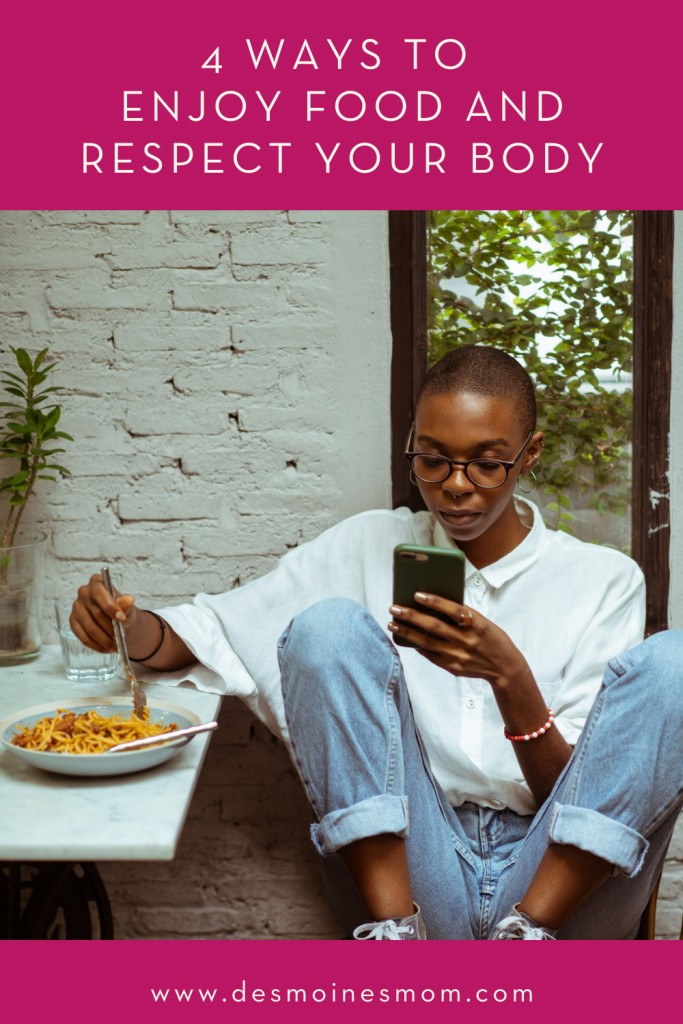 If you were born with a uterus, ovaries, and fallopian tubes, this post is for you.
If you were born with a uterus, ovaries, and fallopian tubes, this post is for you.
As women, we live in a weight-obsessed culture. This is evidenced through the conversations we hear at work, the ads that pop up on our social media feeds, and the constant stream of products and services advertised in the media.
Have any of these thoughts ever crossed your mind?
“I will be happier once I lose weight.”
“I feel fat.”
“If only I were back at my high school weight – THEN I would eat whatever I want without guilt.”
While you can’t change the system in which we live (diet culture), you can cultivate a healthy relationship with food and your body.
4 Steps to Living Well
Step 1: Create a flexible schedule with food.
Why: When your body knows it can expect food from you regularly rather than erratically, it starts to trust that it will be fed at consistent times throughout the day. This in turn leads to your hunger and fullness hormones regulating, which then leads to you trusting your body to tell you when it’s hungry – it’s a beautiful cycle!
How: Before each week starts, plan when you are going to eat. Grab your work, family, and personal calendars to decide how you will make time to eat. It’s easy to push lunch aside when you’re up against a work deadline, but if you schedule it in – as in, actually put it on your calendar – it’s much more likely you’ll actually eat. Eating food consistently (3 meals plus 1-2 snacks) throughout the day ensures you have the proper nutrition for the entire day.
Important note: you don’t need to “save” your calories during the day in order to enjoy dessert with family dinner.
 Step 2: Embrace food neutrality
Step 2: Embrace food neutrality
Why: Labeling food as ‘good’ and ‘bad’ gives food power and morality.
How: Incorporate foods that you enjoy into your day, including diet culture’s favorite villain: carbohydrates! If you are like most women, you might limit your intake of carbs early in the day because you have this idea that carbs will make you gain weight. By the time evening rolls around, your body is so tired that it will do whatever it takes to get some carbs in (hence why so many women reach for snacks after the kids are in bed). No one makes good choices when they are tired or hungry.
Step 3: Wear clothes that feel good.
Why: Wearing clothes that are uncomfortable or painful to wear is mentally and emotionally cruel.
How: Stating the obvious here, but your body has changed since having kids. Your hips are wider, your stomach is softer, and there’s definitely more skin than there used to be – thank goodness because without those changes, your body wouldn’t have been able to grow and deliver a human being.
Honor your body by wearing clothes that make you feel GOOD. Don’t go for a run in baggy sweatpants that cause your inner thighs to chafe. Invest in at least one good sports bra and one good ‘real’ bra. Maybe you need to go up one (or more) size in your leggings so they don’t leave a mark around your stomach when you take them off.
Keep in mind your body didn’t just change from having kids, it also changed because you are ALIVE and as a living thing, your body will continue to change for the rest of your life. Isn’t that amazing?
Step 4: Put time into the relationship you have with your body.
Why: The relationship you have with food and your body is significantly more important than the food you eat.
How: All relationships require some degree of effort, are imperfect, and always evolving. The same is true for the relationship you have with food and your body. Just like a friendship or romantic relationship, time and attention is required to make it a healthy, supportive relationship.
Write down one thing you appreciate about your body each day in a small notebook and when you have a day when you aren’t feeling great about yourself, go to that notebook and read all the things you appreciate that your body does for you. It doesn’t mean you have to “love” your body, but you do need to respect it.
You will always have a body, and you will always need to eat food. It’s worth it to learn to enjoy and respect both!
What is something you can do today to start improving your relationship with food and your body?
 Lisa Nolting believes the relationship you have with food and your body is significantly more important than the food you eat. She is an eating disorder dietitian and founder of the Gentle Nutrition Dietitian, a virtual eating disorder recovery platform for women. She lives in Ames with her husband and two young kids. When she is not working or chasing kids, she can be found in the kitchen or enjoying the outdoors. Connect with her on Instagram @gentlenutritionrd or [email protected]
Lisa Nolting believes the relationship you have with food and your body is significantly more important than the food you eat. She is an eating disorder dietitian and founder of the Gentle Nutrition Dietitian, a virtual eating disorder recovery platform for women. She lives in Ames with her husband and two young kids. When she is not working or chasing kids, she can be found in the kitchen or enjoying the outdoors. Connect with her on Instagram @gentlenutritionrd or [email protected]

















